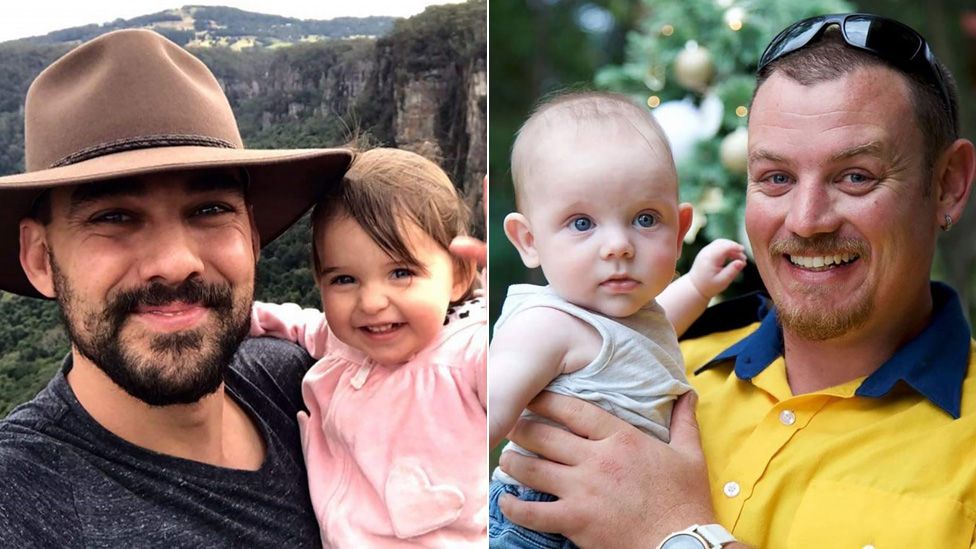Australia fires: PM Morrison apologises for US holiday amid crisis
- Published

Australian Prime Minister Scott Morrison has apologised for going on holiday in Hawaii this week while the nation's bushfire crisis worsened.
Fires are raging across the nation amid a heat wave which has produced the nation's two hottest days on record.
Two volunteer firefighters died on Thursday while fighting a huge blaze near Sydney, while a civilian died in South Australia on Friday.
Mr Morrison said he would end his leave early.
His absence this week, as well as his initial refusal to confirm his whereabouts, has drawn condemnation and protests.
"I deeply regret any offence caused to any of the many Australians affected by the terrible bushfires by my taking leave with family at this time," he said on Friday.
Australia's bushfire emergency has killed eight people, destroyed more than 700 houses and scorched millions of hectares since September.
More than 100 fires broke out in South Australia amid "catastrophic" conditions on Friday, while New South Wales (NSW) is bracing for similar conditions on Saturday.
Tributes have been paid to Geoffrey Keating, 32, and Andrew O'Dwyer, 36, who died when their truck was hit by a falling tree near a fire front, causing it to roll off the road.
Three other firefighters who were also in the vehicle survived with minor injuries.
NSW fire commissioner Shane Fitzsimmons said firefighters everywhere were grieving over the "huge loss" of the two young fathers, who were caught up in "the worst imaginable set of circumstances".
"[They] simply went out, doing a remarkable job, like all their colleagues, and like they have done year-in, year-out, and to not be coming home after their shift is a tremendous grief," he said.
South Australian Premier Steven Marshall said another person had been killed in Murraylands, when the car they were driving hit a tree.
The death has been linked to one of 120 fires that broke out in South Australia on Friday.
Why were people angry with the PM?
Mr Morrison was widely criticised after reports emerged that he was away on unannounced leave and rumoured to be in Hawaii.
Firefighters' union leader Leighton Drury said Australia was "seeing an absolute lack of leadership from this government and it is a disgrace".
Phrases such as #WhereisScoMo, #WhereTheBloodyHellAreYou - a reference to a famous tourism campaign he once oversaw - and #FireMorrison quickly trended online.
Criticism grew as a heatwave broke records across the country and exacerbated mammoth blazes, making the task even harder for exhausted firefighters - many of them volunteers.
Government ministers defended Mr Morrison's break as "appropriate", but refused to confirm his whereabouts. His office told the BBC and others that reports he was in Hawaii were "incorrect".
But on Friday, he confirmed to radio station 2GB that he was in Hawaii with his family. He added he had been receiving regular updates on the fires and last week's New Zealand volcano disaster, which killed at least 11 Australians.
"Given the most recent tragic events, I will be returning to Sydney as soon as can be arranged," he said in a statement.
Why is Morrison facing pressure on climate change?
Many Australians have accused Mr Morrison and his government of inaction on climate change. Although climate change is not the direct cause of bushfires, scientists have long warned that a hotter, drier climate would contribute to Australia's fires becoming more frequent and more intense.
But for much of the fire crisis, the government has been reluctant to talk about the role of climate change in exacerbating blazes. This has sparked other protests.
Australia has been criticised internationally for its climate record, with the UN identifying it as among a minority of G20 nations falling short of its emissions promises.
Australia heatwave: All-time temperature record broken again
Mr Morrison has said the nation only accounts for 1.3% of global emissions. However, Australia is one of the highest emitters of carbon pollution per capita, largely because it is still heavily reliant on coal-fired power.
The Labor opposition has also drawn criticism for policies which support coal mining.
What is happening with the fires?
About 100 blazes are burning in worst-hit NSW, ahead of catastrophic danger on Saturday to areas including Greater Sydney. A state of emergency has been declared.
Fires also broke out in South Australia and Victoria with temperatures in parts of both states exceeding 47C.
Footage shows bushfire "crowning" across treetops
The nation recorded its all-time hottest day twice this week - hitting an average temperature of 41.9C on Wednesday.
What about the smoke?
The vast size of the NSW bushfires - one is burning over 450,000 hectares - has for weeks blanketed towns and cities including Sydney in smoke.
On Friday, for the first time, haze from the NSW bushfires extended to shroud Melbourne in neighbouring Victoria. Between them, Australia's two largest cities hold about two-fifths of the population.
Sydney's air quality has been rated "hazardous" on 28 days in the past two months, causing alarm over a rise in related medical problems.
- Published19 December 2019
- Published28 November 2019
- Published25 January 2019
- Published11 November 2019
- Published31 January 2017
- Published20 December 2019
- Published7 December 2019
- Published10 December 2019